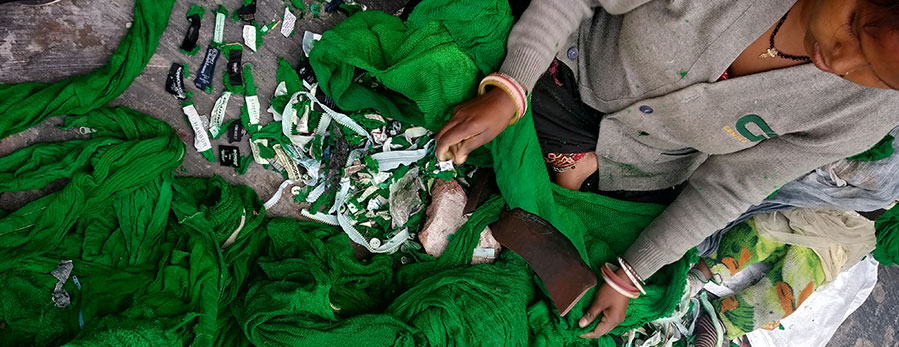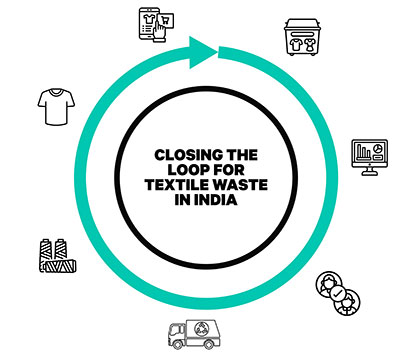#Recycling / Circular Economy
Fashion for Good launches the sorting for circularity india project: New consortium project aims to build a new textile waste value chain in India

The project brings together industry players including Fashion for Good partners adidas, Levi Strauss & Co., PVH Corp., Arvind Limited, Birla Cellulose and Welspun India. A key technology partner for the project is Fashion for Good innovator Reverse Resources who provides the analysis of the pre-consumer textile waste streams in addition to designing and running the pre-consumer pilot. The project is supported through catalytic funding provided by Laudes Foundation.
A COMPLEX TEXTILE LANDSCAPE
India’s position as a manufacturing and consumption market of textiles, provides for large streams of pre-consumer as well as domestic post-consumer waste. Pre-consumer waste is only partially recycled, with the remaining portion mostly downcycled to products of inferior quality. Domestic post-consumer waste on the other hand is exceptionally difficult to trace, with limited data available to understand the waste, quantities, composition and other factors key to its recycling. India is also one of the largest recipients of global post-consumer textile waste, with millions of tonnes, to the value of more than €100m (1), of discarded textile imported and manually sorted through various hubs. Similar to domestic waste, limited information on this imported waste exists.
In addition to the lack of accurate information, no technologies currently exist that organise, categorise and sort materials to ensure quality textile waste is accessible for recyclers, who require sorted feedstocks in large volumes. While these are not the only challenges faced by recyclers, they are significant barriers to the growth of chemical recycling technologies in India.
BUILDING A NEW STRUCTURE TO SCALE TEXTILE RECYCLING
The Sorting for Circularity India project aims to address these challenges and build an accessible infrastructure for manufacturers, sorters, collectors, waste handlers and recyclers in India. Over 15 months, the project will demonstrate a new textile value chain across three phases. Firstly, by obtaining an overall understanding of the textile waste supply chain of pre- and post-consumer textile waste in India. Secondly, by identifying and piloting technologies that enable the traceability of textile waste and its accessibility to existing recyclers. And finally, providing recyclers with access to textile waste feedstocks that meet the quality parameters of advanced recycling technologies, giving these technologies an incentive to scale in India.
Kicking off earlier this month, the first phase to map the current supply chain of textile waste, draws on the expertise and technology of Reverse Resources. This phase also leverages the knowledge, experience and on-the-ground support of local stakeholders Sattva Consulting, a social development consulting and research firm with experience in undertaking landscape, market and community-based studies, and Saahas Zero Waste, proficient in waste management with a stronghold on the informal sector in India and is supported by suppliers selected by the project industry partners who participate in the study. The results and learnings from this phase will be shared in an open source report available to the public, to be released in mid-2022.
CALL FOR COLLABORATION
With the launch of the Sorting for Circularity India Project, Fashion for Good calls on industry stakeholders within the textile waste sector in India to collaborate in this ambitious project to map the Indian textile waste landscape. Data and resources volunteered are crucial to obtaining real world estimates beneficial to mapping the landscape and successfully testing technologies that are best placed to address the challenges.
If you are interested in learning more or supporting the waste mapping, please email us at projects@fashionforgood.com.
DEFINITIONS: Pre-consumer waste - Waste generated during the garment production
process also known as post-production waste e.g. factory offcuts and deadstock Post-consumer waste - Waste generated after use by the end consumer e.g. pre-worn textiles
SUPPORTING QUOTES
“India is a critical hub, not only for textile production and consumption, but also as a global post-consumer textile waste destination. This project is pivotal to understanding the size of this considerable market and providing the incentive, tools and means for the industry to benefit from the wealth of this untapped resource.” Katrin Ley, Managing Director at Fashion for Good

“A collaborative approach to building a reliable and robust supply chain of pre- and post-consumer waste is crucial for scaling the circular business model for the fashion industry and for Birla Cellulose to reach our ambitious goal of scaling circular fibres such as Liva Reviva to 100,000 tonnes per year by 2024. This project can have a huge social impact by creating more value from waste by collection, segregation and upscaling of textile waste and create a win-win situation for all stakeholders while making fashion more sustainable. Birla Cellulose is excited to be part of this partnership.” Mr. H. K. Agarwal, Business Director Designate at Birla Cellulose
“Recycling technologies are going to be the future of the industry and to get there we need access to traceable, high-quality textile waste for all waste streams. We will be looking at efficiently recycling traceable textile waste and help along in building a new textile waste value chain in India. This project is a great opportunity to help organise the India textile waste market, making it traceable and accessible to recyclers, manufacturers, and brands.” Mr. Abhishek Bansal, Head Sustainability at Arvind Limited
“Sorting for Circularity is a very relevant project for the entire textile value chain. I see a lot of incremental value that can be captured by properly sorting the various waste streams and bringing them back into circularity. It will require multi stakeholder participation to reach the desired scale. We are happy to be a part of this project and contribute towards this great initiative to preserve the national capital while reducing dependency on fresh resources. Wishing great success for the project.” - Umasankar Mahapatra, Group Head - Innovation & Sustainability at Welspun India Limited.
“Fossil-fuel based synthetic materials will continue to dominate fashion unless innovations are scaled up, there’s buy-in from the market, and the supply chain infrastructure is developed. We're pleased to see Fashion for Good and Reverse Resources collaborate to drive forward the creativity and ingenuity needed to unlock the potential of circular materials within the industry.” - Anita Chester, Head of Materials at Laudes Foundation
















